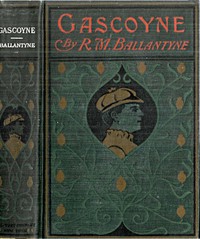Gascoyne, The Sandal-Wood Trader: A Tale of the Pacific by R. M. Ballantyne (classic reads .TXT) 📗

- Author: R. M. Ballantyne
Book online «Gascoyne, The Sandal-Wood Trader: A Tale of the Pacific by R. M. Ballantyne (classic reads .TXT) 📗». Author R. M. Ballantyne
No one could so frequently draw forth the merry laugh that in former days had rung so sweetly over the hillsides of the verdant isle as our young friend Will Corrie. Nothing could delight the heart of the child so much as to witness the mad gambols, not to mention the mischievous deeds, of that ragged little piece of an old door-mat, which, in virtue of its being possessed of animal life, was named Toozle. And when Alice wished to talk quietly,—to pour out her heart, and sometimes her tears,—the bosom she sought on which to lay her head, next to her father's, was that of her useful nursery-maid, a good, kind, and gentle, but an awfully stupid native girl, named Kekupoopi.
This name was, of course, reduced in its fair proportions by little Alice, who, however, retained the latter part thereof in preference to the former, and styled her maid Poopy. Young Master Corrie, on the other hand, called her Kickup or Puppy, indifferently, according to the humor he chanced to be in when he met her, or to the word that rose most readily to his lips.
Mr. Mason replied to the question put by Alice, at the beginning of this somewhat lengthy digression, "No, my lamb, friends would not willingly do us harm; but there are those who call themselves friends who do not deserve the name, who pretend to be such, but who are in reality secret enemies. But go, dearest, to your room; I am busy just now talking with Henry: he, at least, is a trusty friend. When I have done, you shall come back to me."
Alice kissed her father, and, getting off his knee, went at once in search of her friend Poopy.
That dark-skinned and curly black-headed domestic was in the kitchen, seated on the bottom of an overturned iron pot, inside the dingy niche in which the domestic fire was wont to burn when anything of a culinary nature was going on. At the time when her mistress entered, nothing of the kind was in progress, and the fire had subsided to extinction.
The girl, who might have been any age between twelve and sixteen,—nearer the latter, perhaps, than the former,—was gazing with expressionless eyes straight before her, and thinking, evidently, of—nothing. She was clothed in a white tunic, from which her black legs, arms, neck, and head protruded—forming a startling contrast therewith.
"O Poopy! what a bad girl you are!" cried Alice, laughing, as she observed where her maid was seated.
Poopy's visage at once beamed with a look of good-humor, a wide gash suddenly appeared somewhere near her chin, displaying a double row of brilliant teeth surrounded by red gums; at the same time the whites of her eyes disappeared, because, being very plump, it was a physical impossibility that she should laugh and keep them uncovered.
"Hee! hee!" exclaimed Poopy.
We are really sorry to give the reader a false impression, as we feel that we have done, of our friend Kekupoopi, but a regard for truth compels us to show the worst of her character first. She was not demonstrative; and the few words and signs by which she endeavored to communicate the state of her feelings to the outward world were not easily interpreted except by those who knew her well. There is no doubt whatever that Poopy was—we scarcely like to use the expression, but we know of no other more appropriate—a donkey! We hasten to guard ourselves from misconstruction here. That word, if used in an ill-natured and passionate manner, is a bad one, and by no means to be countenanced; but, as surgeons may cut off legs at times, without thereby sanctioning the indiscriminate practise of amputation in a miscellaneous sort of way as a pastime, so this otherwise objectionable word may, we think, be used to bring out a certain trait of character in full force. Holding this opinion, and begging the reader to observe that we make the statement gravely and in an entirely philosophical, way, we repeat that Poopy was, figuratively speaking, a donkey!
Yet she was an amiable, affectionate, good girl for all that, with an amount of love in her heart for her young mistress which words cannot convey, and which it is no wonder, therefore, that Poopy herself could not adequately express either by word or look.
"It's all very well for you to sit there and say 'Hee! hee!'" cried Alice, advancing to the fireplace; "but you must have made a dreadful mark on your clean white frock. Get up and turn round."
"Hee! hee!" exclaimed the girl, as she obeyed the mandate.
The "Oh! oh!! oh!!!" that burst from Alice, on observing the pattern of the pot neatly printed off on Poopy's garment, was so emphatic that the girl became impressed with the fact that she had done something wrong, and twisted her head and neck in a most alarming manner in a series of vain attempts to behold the extent of the damage.
"What a figure!" exclaimed Alice, on recovering from the first shock.
"It vill vash," said Poopy, in a deprecatory tone.
"I hope it will," replied Alice, shaking her head doubtfully; for her experience in the laundry had not yet been so extensive as to enable her to pronounce at once on the eradicability of such a frightfully deep impression. While she was still shaking her head in dubiety on this point, and while Poopy was still making futile attempts to obtain a view of the spot, the door of the kitchen opened, and Master Corrie swaggered in, with his hands thrust into the outer pockets of his jacket, his shirt collar thrown very much open, and his round straw hat placed very much on the back of his head; for, having seen some of the crew of the Talisman, he had been smitten with a strong desire to imitate a man-of-war's-man in aspect and gait.
At his heels came that scampering mass of ragged door-mat Toozle, who, feeling that a sensation of some kind or other was being got up for his amusement, joined heartily in the shout of delight that burst from the youthful Corrie when he beheld the extraordinary figure in the fireplace.
"Well, I say, Kickup," cried the youth, picking up his hat, which had fallen off in the convulsion, and drying his tears, "you're a sweet-lookin' creetur, you are! Is this a new frock you've got to go to church with? Come, I rather like that pattern; but there's not quite enough of 'em. Suppose I lend a hand and print a few more all over you? There's plenty of pots and pans here to do it; and if Alice will bring down her white frock I'll give it a touch-up too."
"How can you talk such nonsense, Corrie!" said Alice, laughing. "Down, Toozle; silence, sir. Go, my dear Poopy, and put on another frock; and make haste, for I have something to say to you."
Thus admonished, the girl ran to a small apartment that opened off the kitchen, and speedily reappeared in another tunic. Meanwhile, Corrie had seated himself on the floor, with Toozle between his knees and Alice on a stool at his side. Poopy, in a fit of absence of mind, was about to resume her seat on the iron pot, when a simultaneous shriek, bark, and roar recalled her scattered faculties, produced a "hee! hee!" varied with a faint "ho!" and induced her to sit down on the floor beside her mistress.
"Now, tell me, Poopy," said Alice, "did you ever hear of friends who were not really friends, but enemies?"
The girl stared with a vacant countenance at the bright, intelligent face of the child, and shook her head slowly.
"Why don't you ask me?" inquired Corrie. "You might as well ask Toozle as that potato Kickup. Eh? Puppy, don't you confess that you are no better than a vegetable? Come, now, be honest."
"Hee! hee!" replied Poopy.
"Humph! I thought so. But that's an odd question of yours, Alice. What do you mean by it?"
"I mean that my papa thinks there are friends in the settlement who are enemies."
"Does he, though? Now that's mysterious," said the boy, becoming suddenly grave. "That requires to be looked to. Come, Alice, tell me all the particulars. Don't omit anything—our lives may depend on it."
The deeply serious manner in which Corrie said this so impressed and solemnized the child, that she related, word for word, the brief conversation she had had with her father, and all that she had heard of the previous converse between him and Henry.
When she had concluded, Master Corrie threw a still more grave and profoundly philosophical expression into his chubby face, and asked, in a hollow tone of voice, "Your father didn't say anything against the Grampus, did he?"
"The what?" inquired Alice.
"The Grampus,—the man, at least, whom I call the Grampus, and who calls hisself Jo Bumpus."
"I did not hear such names mentioned; but Henry spoke of a wounded nigger."
"Aye, they're all a set of false rascals together," said Corrie.
"Niggers ob dis here settlement is good mans, ebery von," said Poopy, promptly.
"Hallo! Kickup, wot's wrong? I never heard you say so much at one time since I came to this place."
"Niggers is good peepils," reiterated the girl.
"So they are, Puppy, and you're the best of 'em; but I was speakin' of the fellers on the other side of the island,—d'ye see?"
"Hee! hee!" ejaculated the girl.
"Well, but what makes you so anxious?" said Alice, looking earnestly into the boy's face.
Corrie laid his hand on her head and stroked her fair hair as he replied:
"This is a serious matter, Alice; I must go at once and see your father about it."
He rose with an air of importance, as if about to leave the kitchen.
"Oh! but please don't go till you have told me what it is; I'm so frightened," said, Alice; "do stay and tell me about it before you go to papa."
"Well, I don't mind if I do," said the boy, sitting down again. "You must know, then, that it's reported there are pirates on the island."
"Oh!" exclaimed Alice.
"D'ye know what pirates are, Puppy?"
"Hee! hee!" answered the girl.
"I do believe she don't know nothin'," said the boy, looking at her with an air of compassion; "wot a sad thing it is to belong to a lower species of human natur! Well, I s'pose it can't be helped. A pirate, Kickup, is a sea-robber. D'ye understand?"
"Ho! ho!"
"Aye, I thought so. Well, Alice, I am told that there's been a lot of them landed on the island and took to chasin' and killin' the niggers, and Henry was all but killed by one o' the niggers this very morning, an' was saved by a big feller that's a mystery to me, and by the Grampus, who is the best feller I ever met,—a regular trump, he is; and there's all sorts o' doubts, and fears, and rumors, and things of that sort, with a captain of the British navy, that you and I have read so much about, trying to find this pirate out, and suspectin' everybody he meets is him. I only hope he won't take it into his stupid head to mistake me for him,—not so unlikely a thing, after all." And the youthful Corrie shook his head with much gravity, as he surveyed his rotund little legs complacently.
"What are you laughing at?" he added, suddenly, on observing that a bright smile had overspread Alice's face.
"At the idea of you being taken for a pirate," said the child.
"Hee! hee! ho! ho!" remarked Poopy.
"Silence, you lump of black putty!" thundered the aspiring youth.
"Come, don't be cross to my maid," said Alice, quickly.
Corrie laughed, and was about to continue his discourse on the events and rumors of the day, when Mr. Mason's voice was heard at the other end of the house.
"Ho! Corrie."
"That's me," cried the boy, promptly springing up and rushing out of the room.
"Here, my boy; I thought I heard your voice. I want you to go a message for me. Run down, like a good lad, to Ole Thorwald, and tell him to come up here as soon as he conveniently can. There are matters to consult about which will not brook delay."
"Ay, ay, sir," answered Corrie, sailor fashion, as he touched his forelock and bounded from the room.
"Off on pressing business," cried the sanguine youth, as he dashed through the kitchen, frightening Alice, and throwing Toozle into convulsions of delight,—"horribly important business, that 'won't brook delay;' but what brook





Comments (0)